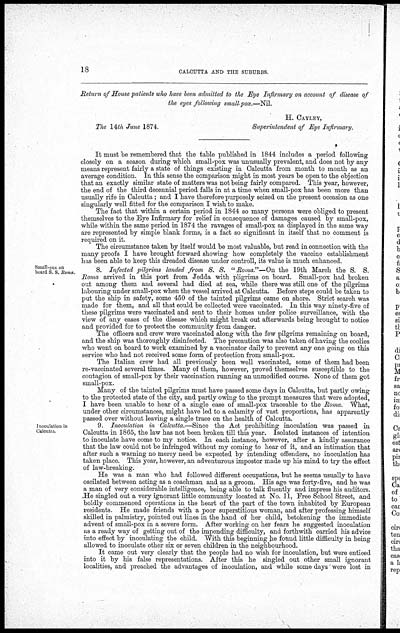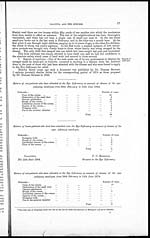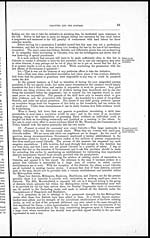Medicine - Vaccination > 1874-1889 - Report on vaccination in the Province of Bengal > Report on vaccination in the Province of Bengal for the year ending 31st March 1874
(31) Page 18
Download files
Individual page:
Thumbnail gallery: Grid view | List view

18 CALCUTTA AND THE SUBURBS.
Return of House patients who have been admitted to the Eye Infirmary on account of disease of
the eyes following small-pox.—Nil.
H. CAYLEY,
The 14th June 1874. Superintendent of Eye Infirmary.
It must be remembered that the table published in 1844 includes a period following
closely on a season during which small-pox was unusually prevalent, and does not by any
means represent fairly a state of things existing in Calcutta from month to month as an
average condition. In this sense the comparison might in most years be open to the objection
that an exactly similar state of matters was not being fairly compared. This year, however,
the end of the third decennial period falls in at a time when small-pox has been more than
usually rife in Calcutta; and I have therefore purposely seized on the present occasion as one
singularly well fitted for the comparison I wish to make.
The fact that within a certain period in 1844 so many persons were obliged to present
themselves to the Eye Infirmary for relief in consequence of damages caused by small-pox,
while within the same period in 1874 the ravages of small-pox as displayed in the same way
are represented by simple blank forms, is a fact so significant in itself that no comment is
required on it.
The circumstance taken by itself would be most valuable, but read in connection with the
many proofs I have brought forward showing how completely the vaccine establishment
has been able to keep this dreaded disease under controll, its value is much enhanced.
Small-pox on
board S. S. Roma.
8. Infected pilgrims landed from S. S. " Roma."—On the 19th March the S. S.
Roma arrived in this port from Jedda with pligrims on board. Small-pox had broken
out among them and several had died at sea, while there was still one of the pilgrims
labouring under small-pox when the vessel arrived at Calcutta. Before steps could be taken to
put the ship in safety, some 450 of the tainted pilgrims came on shore. Strict search was
made for them, and all that could be collected were vaccinated. In this way ninety-five of
these pilgrims were vaccinated and sent to their homes under police surveillance, with the
view of any cases of the disease which might break out afterwards being brought to notice
and provided for to protect the community from danger.
The officers and crew were vaccinated along with the few pilgrims remaining on board,
and the ship was thoroughly disinfected. The precaution was also taken of having the coolies
who went on board to work examined by a vaccinator daily to prevent any one going on this
service who had not received some form of protection from small-pox.
The Italian crew had all previously been well vaccinated, some of them had been
re-vaccinated several times. Many of them, however, proved themselves susceptible to the
contagion of small-pox by their vaccination running an unmodified course. None of them got
small-pox.
Many of the tainted pilgrims must have passed some days in Calcutta, but partly owing
to the protected state of the city, and partly owing to the prompt measures that were adopted,
I have been unable to hear of a single case of small-pox traceable to the Roma. What,
under other circumstances, might have led to a calamity of vast proportions, has apparently
passed over without leaving: a single trace on the health of Calcutta.
Inoculation in
Calcutta.
9. Inoculation in Calcutta.—Since the Act prohibiting inoculation was passed in
Calcutta in 1865, the law has not been broken till this year. Isolated instances of intention
to inoculate have come to my notice. In each instance, however, after a kindly assurance
that the law could not be infringed without my coming to hear of it, and an intimation that
after such a warning no mercy need be expected by intending offenders, no inoculation has
taken place. This year, however, an adventurous impostor made up his mind to try the effect
of law-breaking.
He was a man who had followed different occupations, but he seems usually to have
oscilated between acting as a coachman and as a groom. His age was forty-five, and he was
a man of very considerable intelligence, being able to talk fluently and impress his auditors.
.He singled out a very ignorant little community located at No. 11, Free School Street, and
boldly commenced operations in the heart of the part of the town inhabited by European
residents. He made friends with a poor superstitious woman, and after professing himself
skilled in palmistry, pointed out lines in the hand of her child, betokening the immediate
advent of small-pox in a severe form. After working on her fears he suggested inoculation
as a ready way of getting out of the impending difficulty, and forthwith carried his advice
into effect by inoculating the child. With this beginning he found little difficulty in being
allowed to inoculate other six or seven children in the neighbourhood.
It came out very clearly that the people had no wish for inoculation, but were enticed
into it by his false representations. After this he singled out other small ignorant
localities, and preached the advantages of inoculation, and while some days' were lost in
Set display mode to: Large image | Zoom image | Transcription
Images and transcriptions on this page, including medium image downloads, may be used under the Creative Commons Attribution 4.0 International Licence unless otherwise stated. ![]()
| India Papers > Medicine - Vaccination > Report on vaccination in the Province of Bengal > Report on vaccination in the Province of Bengal for the year ending 31st March 1874 > (31) Page 18 |
|---|
| Permanent URL | https://digital.nls.uk/91536247 |
|---|
| Additional NLS resources: | |
|---|---|




